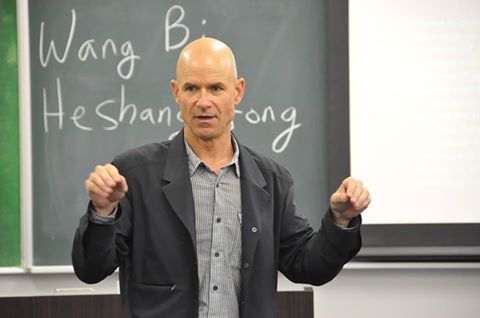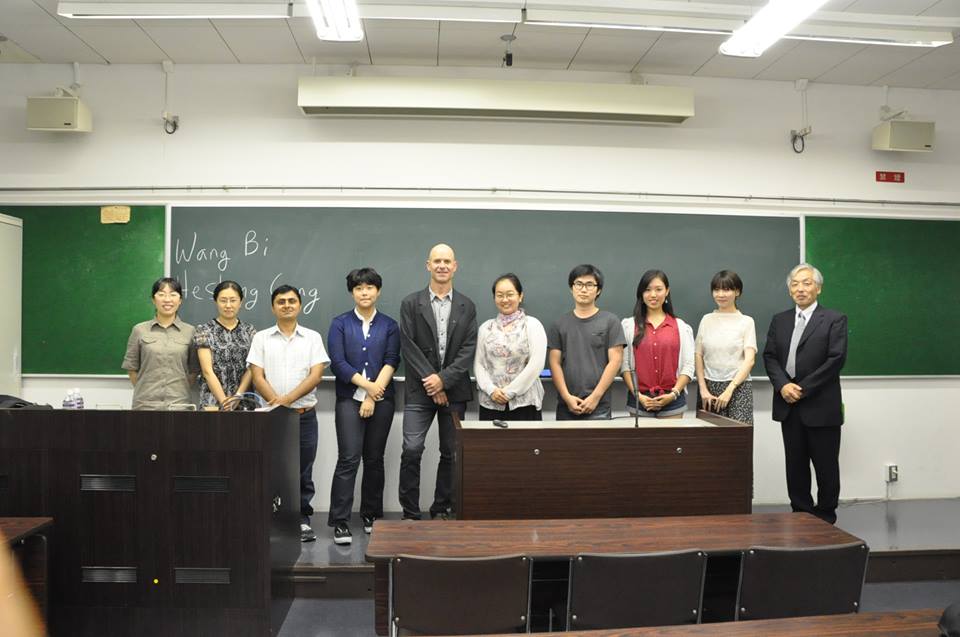Center for Interdisciplinary Study of Monotheistic Religions(CISMOR)Doshisha University
> Public Lectures > 【For Students and Academics】CISMOR Seminar “Laozi as a God: What Was Lost in the Western Imagination of Daoism?”Public Lectures
CISMOR Seminar Series
【For Students and Academics】CISMOR Seminar “Laozi as a God: What Was Lost in the Western Imagination of Daoism?”
| Date: |
2016/07/06 16:40-18:10 |
|---|---|
| Place: | Room S33, Shisei-kan, Imadegawa Campus, Doshisha University |
| Lecture: |
Prof. James Robson (East Asian Languages and Civilizations at Harvard University) James Robson is Professor of East Asian Languages and Civilizations. He is the Director of Undergraduate Studies, East Asian Studies, and has served as Director of Graduate Studies for the Regional Studies East Asia M.A. program. He teaches East Asian religions, in particular Daoism, Chinese Buddhism, and Zen, as well as the sophomore tutorial for concentrators. Robson received his Ph.D. in Buddhist Studies from Stanford University in 2002, after spending many years doing research in China, Taiwan, and Japan. He specializes in the history of medieval Chinese Buddhism and Daoism and is particularly interested in issues of sacred geography, local religious history, talismans, and Chan/Zen Buddhism. He has been engaged in a long-term collaborative research project with the École Française d’Extrême-Orient studying local religious statuary from Hunan province. He is the author of Power of Place: The Religious Landscape of the Southern Sacred Peak [Nanyue 南嶽] in Medieval China (Harvard, 2009), which was awarded the Stanislas Julien Prize for 2010 by the French Academy of Inscriptions and Belles-Lettres and the 2010 Toshihide Numata Book Prize in Buddhism. Robson is also the author of "Signs of Power: Talismanic Writings in Chinese Buddhism" (History of Religions 48:2), "Faith in Museums: On the Confluence of Museums and Religious Sites in Asia" (PMLA, 2010), and "A Tang Dynasty Chan Mummy [roushen] and a Modern Case of Furta Sacra? Investigating the Contested Bones of Shitou Xiqian." His current research includes a long term project on the history of the confluence of Buddhist monasteries and mental hospitals in Japan. |
| Summary: | |
|
Daoism is one of the better known—but least understood—religions of the world. Ideas about Daoism spread primarily through translations and interpretations of texts considered to be its sacred books: The Scripture of the Way and Its Virtue (Daode jing) and the Book of Master Zhuang (Zhuangzi), which generated tremendous transcultural appeal. Those texts have been connected with Jean-Jacques Rousseau (1712–1778), Enlightenment thinkers like Immanuel Kant (1724–1804), transcendentalists like Henry David Thoreau (1817–1862) and Ralph Waldo Emerson (1803–1882), occultists like Aleister Crowley (1875–1947), the prominent Jewish philosopher, essayist, and translator Martin Buber (1878-1965), the Continental philosopher Martin Heidegger (1889–1976) and literary figures like Alfred, Lord Tennyson (1809-1892) and Oscar Wilde (1854-1900). The Western imagination of Daoism has influenced the perception of Daoism down to the present day. It has essentially created two Daoisms, imposing an artificial distinction between the “pure” (philosophy) and the “impure” (Daoist religious practices) in a process similar to the European fashioning of Buddhism as a philosophy rather than a religion. Although modern scholarship has shown that such a stark division of religion and philosophy is inaccurate and untenable, it has resulted in widespread confusion about Chinese religions in general and Daoism in particular. This talk intends to explore the troubling questions surrounding this divide and reveal some of the lesser known facets of the Daoist tradition that have been occluded by the appeal and myopic focus on texts like the Daode jing. [Program] 16:40 - 16:45 Opening Remarks / Prof. Junya Shinohe (Director of CISMOR) 16:45 - 17:25 Lecture / Prof. James Robson 17:25 - 18:10 Discussion |
|
|
The seminar series is open for students and academics. If you would like to participate in this seminar, please send an email to the CISMOR office in advance: info@cismor.jp. Registration closes on July 5. Language: English only, No interpretation |
|
|
20160706poster |
|

